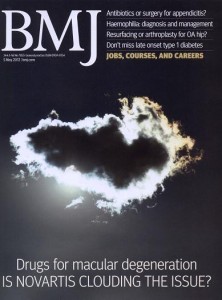The NHS is reported to be spending £9 billion a year treating diabetes ineffectively File on Four. BBC Radio 4 21 February 2012.)
 Perhaps the most important contributory cause to the rise in diabetes in recent years is overweight and obesity, yet a cost-effective, evidence-based option for treating the condition appears to be being overlooked. Rapid weight loss using a very low calorie diet (VLCD) regime has been shown to normalise blood sugar levels within a few days, requiring withdrawal of hypoglycaemic medication. 1,2 VLCD also lowers the risk factors for cardiovascular disease.
Perhaps the most important contributory cause to the rise in diabetes in recent years is overweight and obesity, yet a cost-effective, evidence-based option for treating the condition appears to be being overlooked. Rapid weight loss using a very low calorie diet (VLCD) regime has been shown to normalise blood sugar levels within a few days, requiring withdrawal of hypoglycaemic medication. 1,2 VLCD also lowers the risk factors for cardiovascular disease.
Bariatric surgery is another recognised method of weight reduction for obese patients with diabetes. However, the effect
on blood sugar is stronger with VLCD than with bariatric surgery as post-surgical nutrition includes a significant amount of carbohydrate, thus preventing the rapid utilisation of blood sugar and glycogen stores fundamental in a ketogenic VLCD. Furthermore, while there are around three quarters of a million patients who meet the NICE criteria for eligibility for bariatric surgery, the health system barely begins to meet the demand and last year less than 9000 operations, NHS and private combined, were performed.
Lipotrim is a well-established VCLD programme, supervised by GPs or pharmacists, which has been running successfully for over 25 years. GPs can monitor their patients on the programme themselves, although the monitoring task is usually provided by pharmacists who also supply the Total Food Replacement products. The programme has the additional advantage of being cost neutral to the NHS as the products are not ordinarily prescribed, while the cost to patients is usually more than compensated by the reduction in their food bills. Lipotrim refeeding and maintenance programmes are available for patients to maintain their weight at the reduced level once a target has been achieved.
Abundant evidence is available of the success of Lipotrim VLCD programmes run in UK pharmacies. More than 2000 pharmacies offer the service and many record their patients’ progress using Patient Tracker software, which produces
detailed audits providing substantial evidence of efficacy across a wide spectrum of patients and medical conditions. For example, audit results from 400 patients treated in one pharmacy have recorded an average weight loss of 11% across all clients after three or more weeks on the Lipotrim programme. 3
Percentage of initial weight lost by patients in this group reached as high as 37%. Average percentage weight loss rose with increasing BMI at outset, from 9% loss in clients with a BMI of 25-30, to 13% with starting BMI of 35-40 and 21% for those with starting BMI of 45-50. The figures also show that weight losses were maintained during refeeding and maintenance after dieting. There is also evidence from the Tracker that an average weight loss of around 14% can be
achieved on the Lipotrim programme by hypothyroid patients, who generally experience great difficulty with weight
management. And average weight losses of 12-13% in patients with hypertension and depression, conditions to which
excess weight can be a contributory factor, have also been shown.
For further information, contact Valerie Beeson, Clinical Programme Director, Howard Foundation Research Ltd. Cambridge UK. E-mail: obesity@lipotrim.demon.co.uk. Phone:01223 812812.
References
1. Paisey RB, et al. An intensive weight loss programme in established type 2 diabetes and controls: effects on weight and
atherosclerosis risk factors at 1 year. Diabet Med.1998; 15:73-9.
2. Paisey RB, et al. Five year results of a prospective very low calorie diet or conventional weight loss programme in type 2 diabetes. J Hum Nutr Diet. 2002;15:121-7.)
3. Pharmacist Gareth Evans, Waistaway Ltd. Data on file.
PDF version:3-2-BMJ-May-2012